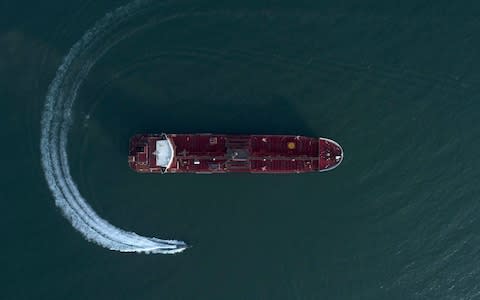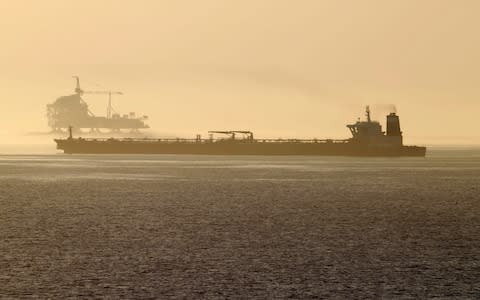Iran oil tanker at centre of diplomatic row with UK 'goes dark' off Syria after being released by Gibraltar

The tanker at the centre of a diplomatic row between Iran and Britain “went dark” yesterday night off the coast of Syria, where it is suspected she may be delivering a controversial cargo of Iranian crude oil.
The Adrian Darya 1, formally named Grace 1, would be doing so in breach of an agreement made to secure its release and threatens to become a major political embarrassment for the UK.
The vessel was detained by British Royal Marine commandos off Gibraltar on July 4 as it was believed to be en route to Syria in violation of European Union sanctions.
Two weeks later, Iran in retaliation seized British-flagged Stena Impero in the Strait of Hormuz leading into the Gulf.
Gibraltar released the Adrian Darya on August 15 after receiving formal written assurances from Tehran that the ship would not discharge its 2.1 million barrels of oil in Syria. The Stena has not been released.

Iran changed the Grace 1’s name and sold the oil, though it did not disclose the buyer.
Since then it has been sailing around the Mediterranean with its load, continually changing its destination port.
The US Treasury Department blacklisted the tanker on Friday, citing intelligence it was planning to deliver its crude to Syria.

Washington warned any state against assisting the ship, saying it would consider that support for a terrorist organisation, namely, Iran's Islamic Revolutionary Guard Corps, prompting Greece to deny the Adrian permission to dock.
According to TankerTrackers.com, which uses satellite tracking to record shipping movements, the vessel sent its last signal giving its position in international waters heading north towards Syria at 5.53pm local time on Monday.
"It's now safe to assume she's in Syria's territorial waters," TankerTrackers.com tweeted.
It is now thought to be sitting off the coast of Tartus awaiting a ship-to-ship transfer via one of a handful of Iranian-linked tankers in the region, also currently with no Automatic Identification System signals active.
It is not against international law for a ship to turn her AIS off, but it is often done to try to get around sanctions.
Lloyd’s List Intelligence suggested two possible smaller vessels that may be involved in any transfer.
Silvia 1, an Iran-flagged tanker, turned off its transponder on August 29 having entered the Mediterranean via the Suez Canal.
While Stark I, a 159,681 dwt, Iran-flagged crude tanker, took a similar route, also dropping off communication late on August 30.
“The fact that Adrian Darya 1 is currently skirting the Syrian coast with its AIS offline, awaiting what the US intelligence services expect to be an imminent ship-to-ship transfer, which will ultimately see its cargo end up in Syria, is politically embarrassing for almost everyone except Iran,” said Richard Meade, managing editor of Lloyd’s List Intelligence.

The oil delivery could undermine European efforts to broker US-Iran talks. The UK, which has been pulled in opposing directions by European and American allies, has been trying to keep a diplomatic track with Tehran despite rising tensions.
President Donald Trump pulled the US out of the nuclear deal with Tehran last year, leaving EU signatories scrambling to keep it alive.
An Iranian government spokesman said on Tuesday it will "take a strong step" away from its 2015 nuclear accord if Europe cannot offer the country new terms by a deadline at the end of this week, as top Iranian diplomats travelled to France and Russia for last-minute talks.
Should the Adrian offload as expected, it will raise questions as to whether the Islamic republic is acting in good faith.

